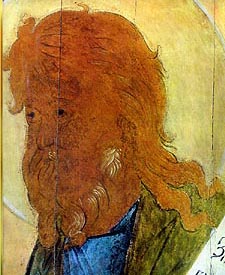|
|||
|---|---|---|---|
| This weekly bulletin insert complements the curriculum published by the Department of Christian Education of the Orthodox Church in America. This and many other Christian Education resources are available at http://dce.oca.org. | |||

The prophet and priest Ezekiel was known as a visionary who had vivid dreams. But, as the Book of Ezekiel tells us, he was also stern and unyielding in his insistence on Israel's responsibility to God, having been given a forehead "like adamant harder than flint" by the Lord (3: 9). He would need to be adamant in the first years of his ministry because, as God told him, he would be dealing with "all the house of Israel", who were "of a hard forehead and of a stubborn heart" (3: 7). One of Ezekiel's famous visions came as he began his ministry. He saw a kind of chariot or wagon on four wheels, full of brightness and flashing fire, drawn by four fantastic-looking creatures. It came from the north, in a great cloud and driven by a rush of wind. The chariot was topped by a throne, on which was a seated figure. Ezekiel couldn't describe any of this in clear terms; he could only say, "Such was the appearance of the likeness of the glory of the Lord" (1:28). Ezekiel was so overwhelmed that he fell on his face, but God graciously called him to rise so that they could speak face to face. Ezekiel needed help from the Spirit to be able to stand up, but he did so, and was told that he must go and prophesy to the "impudent and stubborn" people of Israel. The prophet spent the years from 593 to 586 in Jerusalem. He saw shocking things going on in the Temple itself: people were worshipping the pagan sun-god and practicing other pagan rites. When Jerusalem fell to the Babylonians in 586, Ezekiel was devastated but hardly surprised. He had warned the people that God would let it happen and they had not listened. By 587, Ezekiel had joined the Babylonian exiles. He felt compassion for them, and took very seriously the Lord's words: "So you, son of man, I have made a watchman for the house of Israel; whenever you hear a word from my mouth you shall give them warning from me" (33: 7). Ezekiel reminded the exiles that his job was to watch and warn, but that each person was personally responsible before God.
Ezekiel also reassured the exiles that the foreign conquest of Jerusalem did not mean that God had abandoned His people, as some of them feared. His visions continued, including the vision of a valley full of dry bones that are renewed to life by God's word. This is a prophecy of the restoration of Israel, but also a foretelling of the new life given by Jesus Christ, which is why it is part of the Orthodox Church's worship during Holy Week. Ezekiel had a vision of Israel's people once again living in their land, worshipping God in the restored Temple. He also prophesied in a way that anticipates Christ's words: "I will bring back the strayed, and I will bind up the crippled, and I will strengthen the weak, and the fat and the strong I will watch over" (34: 16). |
|||
